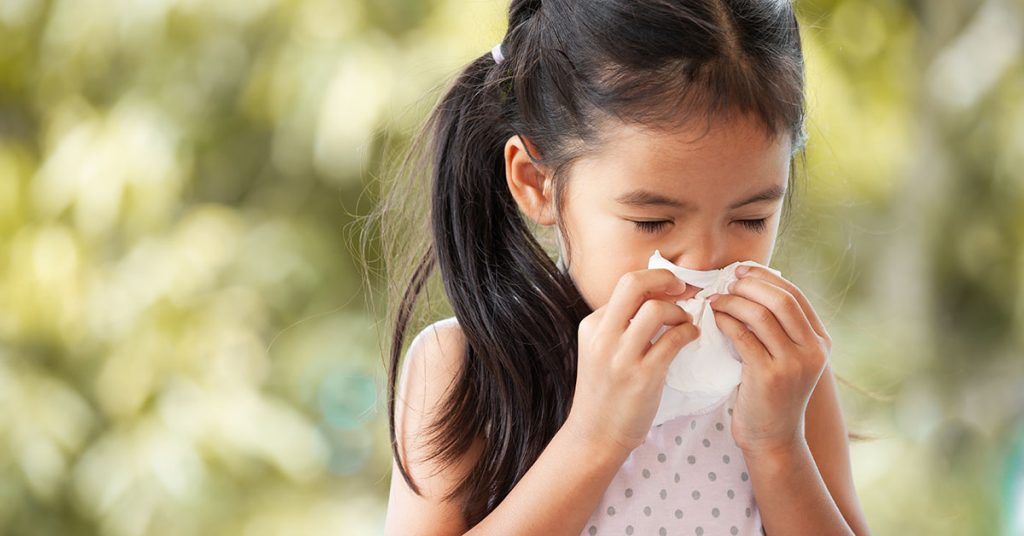When allergens enter our bodies, our immune system reacts, sometimes triggering hypersensitivity. The main causes for this include changes in weather, different foods, etc. Modern research has shown that Allergy treatment in Ayurveda is successful and has yielded success for years.
Allergy treatments vary with each allergy. For example, treatment for skin allergy probably wouldn’t work the same for dust allergy or allergic rhinitis. Allergies in children do not necessarily cause sneezing or wheezing, they can also show up on their skin. Let’s know more.
AYURVEDA AND ALLERGIES
Ayurveda tells us how the imbalance of the three doshas vita, pitta, and kapha, can cause allergies, and when this imbalance occurs there is an increase in toxins. These toxins accumulate, affecting the immune system and affecting the body.
Allergy Treatment in Ayurveda is done by finding and treating the root cause, boosting the immune system using different herbs as medicine, managing a healthy diet, incorporating a healthy lifestyle, and consistent treatment.
Common allergies in children include dust allergies, skin allergies, and allergic rhinitis.
AYURVEDA TREATMENT FOR SKIN ALLERGY
Different foods, materials, weather changes, specific ingredients, etc, are a few of the causes. Some reactions to such allergens can be itchiness, swelling, redness, rashes, dry patches on the skin, runny nose, and watery eyes. These are also some of the common symptoms of allergies in children.
Ayurveda treatments for skin allergy include various home remedies as well. Some ways include:
Cold compress: helps with temporary pain relief, swelling, or redness and helps with healing.
Green tea cleansing: green tea has anti-bacterial properties that help with irritation and rashes. For this, make green tea, cool it down, and clean the area with the green tea.
- Aloe vera gel: Aloe vera is one of the most commonly used remedies for irritation. It is hydrating and also has anti-bacterial properties. Just cut aloe vera and apply the gel directly to the affected area.
- Essential oils: Using the most suitable one that is recommended, gently and delicately massaging the area can help with blood flow and lessen the symptoms. A few oils that can help with this are Eucalyptus Oil, Tea Tree Oil, Lavender Oil, and Chamomile Oil.
- Neem: It has anti-bacterial properties and is considered one of the best remedies. Use the neem paste or the oil form and apply it to the affected region.
- Manjistha: Has anti-bacterial properties and can help cool down the affected area. Just like neem apply it in a paste or oil form on the area to help cool it down.
- Khadira: In the case of allergy caused by heat, and for irritation and tingling, you can apply the paste of khadira leaves for relief and help with faster healing.
AYURVEDA TREATMENT FOR DUST ALLERGY
Dust allergies are caused by tiny dust mites living in dust particles around you. Symptoms include sneezing, itchy, red watery eyes and nose. The main way to combat dust allergies would be to keep your surroundings clean and avoid dust.
Some ayurveda treatments for dust allergy include honey which helps with seasonal allergies, peppermint tea with anti-inflammatory and decongestant properties, green tea with anti-bacterial properties, Neti pot an ayurvedic method using warm salt water to clean your nasal passage, etc.
AYURVEDA TREATMENT FOR ALLERGIC RHINITIS
Allergic Rhinitis is the swelling of the nasal passage which causes sneezing, congestion, itching, runny nose, pain in the ears and eyes, and headache. Allergic Rhinitis is a common respiratory disease that is rarely harmful but if untreated can become harmful.
Treatment for allergic rhinitis in Ayurveda focuses first on balancing the three doshas and detoxifying and clearing sinuses and phlegm. A Nasya treatment, nasal drop therapy, is done using herbal oils like Anu or Shadbindutaila.
In addition to these, ayurvedic treatment of allergic rhinitis also focuses on managing a healthy diet and lifestyle, for improving health and healing.
To manage diet, one must consume foods like lukewarm water, legumes, soups, and more. Avoid heavy foods, non-vegetarian food, bananas, foods that can cause congestion, and more. Lifestyle changes include regular exercises, rubbing nilgiri oil on your chest to prevent the trigger of an attack, taking rest, and avoiding sleeping during the daytime.
Some ayurvedic medicines for allergic rhinitis include:
- Haridrakhand which is anti-allergic, anti-histaminic, anti-oxidant, and anti-inflammatory, can help stop sneezing and reduce congestion.
- SitopladiChurna which is anti-inflammatory, helps treat chest congestion and is mainly used to treat immune system and respiratory conditions.
- AbhrakBhasma which is boosts lung health and strengthens the lung tissue.
- ChyawanprashRasayana which is made with different herbs and herbal extracts can help strengthen the body’s defence mechanism and fight any external stimuli.
CONCLUSION
Ayurveda has been used for years, with exemplary results, and has continued to be used by many. Allergies in children show up differently in every child. It offers different treatments and medicines that can help balance the three doshas like vata, pitta, and kapha, and help improve your child’s health and lifestyle, which can help them as they grow up.
Mostly, ayurvedic treatment aims to treat these allergies using natural methods and herbal medicines which can help improve the immune system without causing more side effects than it normally would by focusing on the root cause of it.





